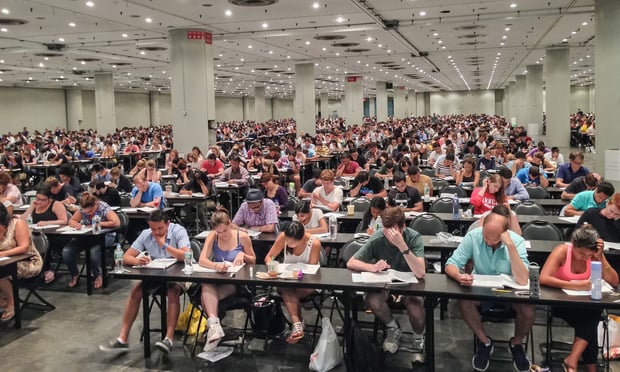Florida is sticking with the July bar exam.
The Florida Board of Bar Examiners announced May 5 that it intends to move ahead with the regularly scheduled bar exam July 28 and 29, and that the Florida Supreme Court has signed off on the plan. That makes Florida the largest jurisdiction to administer the licensing exam in July without offering another test date in September. Last year, 2,688 people sat for Florida’s July bar exam—the fourth largest July test in the country.
New York and California, the two largest bar exam jurisdictions, have both canceled the July exam and rescheduled the test for Sept. 9 and 10 due to the COVID-19 pandemic, and California may offer the exam online. The third-largest jurisdiction, Texas, has said it will offer the exam in both July and September, which should make maintaining social distancing guidelines easier. And Illinois, which last July had about 700 fewer bar takers than Florida, has also moved its test to September.
“The Board has been working closely with the Florida Department of Health and other medical experts to identify and implement protocols that the [the health department] requires for the safe administration of the exam for all involved, including applicants, administrators, and proctors,” reads the Florida Board of Bar Examiners’ announcement.
That decision was unveiled the same day that the National Conference of Bar Examiners said it has received enough interest from jurisdictions that wish to administer the bar exam in July that it will supply July test materials to those who want them. Among the other states holding the test in July are Virginia, North Carolina and Missouri, though the latter two jurisdictions have said they will give a second bar exam in September if needed—a step Florida has thus far not taken.
Last month, the deans of the state’s 12 law schools wrote to the state’s bar authorities requesting that it offer the bar exam in both July and September—a move they argued would give test-takers more flexibility and make it safer.
“This approach would give examinees more opportunities to test, and more flexibility to accommodate diverse circumstances,” their letter reads. “It also will reduce the number of examinees at each administration, which will make it easier to impose safety measures and ensure exam security.”
University of Miami Law Dean Anthony Varona, who spearheaded the April letter from the deans, was unavailable Wednesday to comment on the decision to hold one exam in July, according to a law school spokeswoman. But Erin O’Hara O’Connor, dean of the Florida State University College of Law, said in an interview Wednesday that holding the bar exam in July appears to be the best outcome for students.
“We’re relieved that they [Florida Board of Bar Examiners] will try the July bar exam,” O’Connor said. “I know that our graduates are best situated and best prepared to pass the bar in July. The longer they delay, the staler their education becomes and the most likely they are to have to take on full-time work so they can’t devote the time they need to study for the bar. If health conditions permit, the July bar is the best option, I think, for our graduates.”
O’Connor said she believes that bar officials may move the bar exam to September if health conditions deteriorate and it proves unsafe to deliver the test in July, but that the threat of hurricane season in the fall gave officials pause in committing to a September exam.
Student reaction to the decision has been mixed, said University of Florida Levin College of Law dean Laura Rosenbury.
“Many students are ecstatic because they have financial situations that depend on licensure and employment,” she said. “Other students are really concerned. Even though the Florida Board of Bar Examiners has made major changes to how they will administer the exam, we don’t know a foolproof way to prevent the spread of the virus. So we will support students who decide to delay taking the bar.”
But some legal educators outside the state have concerns about the plan, including Ohio State University professor Deborah Merritt. She is among a cohort of legal educators advocating for alternative approaches to attorney licensing this year such as emergency diploma privileges, supervised practice programs, and online bar exams.
“Candidates will have to take the exam while wearing masks and worrying about the risk of infection by other test-takers,” Merritt said Wednesday of the Florida plan. “If a single test-taker removes a mask, that will provoke additional stress among those seated in the same room—as well as disruption while proctors expel that test-taker. These are not appropriate conditions for administering a high-stakes exam designed to assess minimum competence.”
Florida is adding a second testing site in July, designed to help reduce the number of examinees congregating at the Tampa Convention Center, which is the traditional testing site. In addition to Tampa, the July exam will be administered at the Orange County Convention Center in Orlando. Test-takers will be required to wear masks and workers from the Florida Department of Health will screen all examinees, proctors, and administrators before they enter the testing sites. Anyone with a temperature of 100.4 degrees will not be allowed in.
Additionally, the examinees will sit one person to a table instead of the typical two, with tables at least six feet apart. Candidates will also be required to stand six feet apart while waiting in line. The Florida Board of Bar Examiners also warned that bar takers from outside of Florida may be required to quarantine for 14 days before taking the test, per current state orders.
Moving forward with the July exam will put additional stress on test-takers, particularly those with disabilities, warned Matthew Dietz, the litigation director at Miami-based nonprofit advocacy group Disability Independence Group. It’s unclear how bar examiners will accommodate immunocompromised test-takers and those with learning disabilities or severe anxiety who require private testing rooms.
“While there is no doubt that the Florida Bar of Bar Examiners had the interest and safety of the applicants so they could earn a livelihood, but failed to take into account the mental health and wellness of these applicants to our profession,” Dietz wrote in a letter to the Daily Business Review.
NOT FOR REPRINT
© 2024 ALM Global, LLC, All Rights Reserved. Request academic re-use from www.copyright.com. All other uses, submit a request to [email protected]. For more information visit Asset & Logo Licensing.


 Simulated Multistate Bar Examination.
Simulated Multistate Bar Examination.





